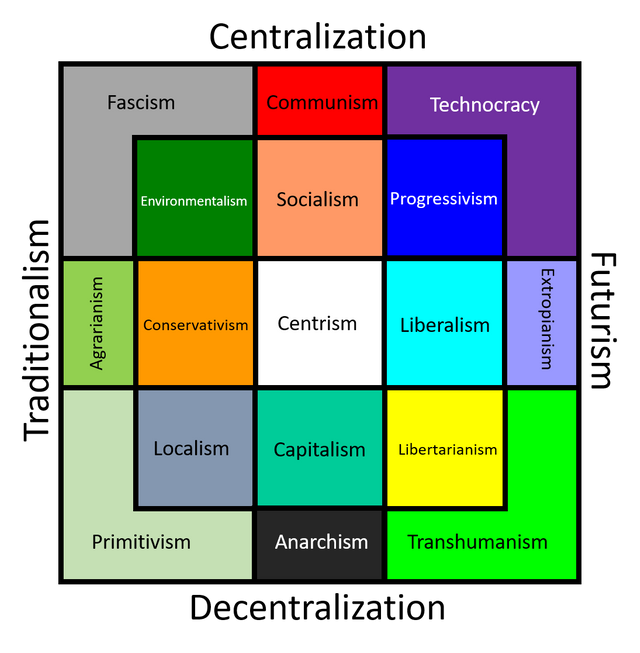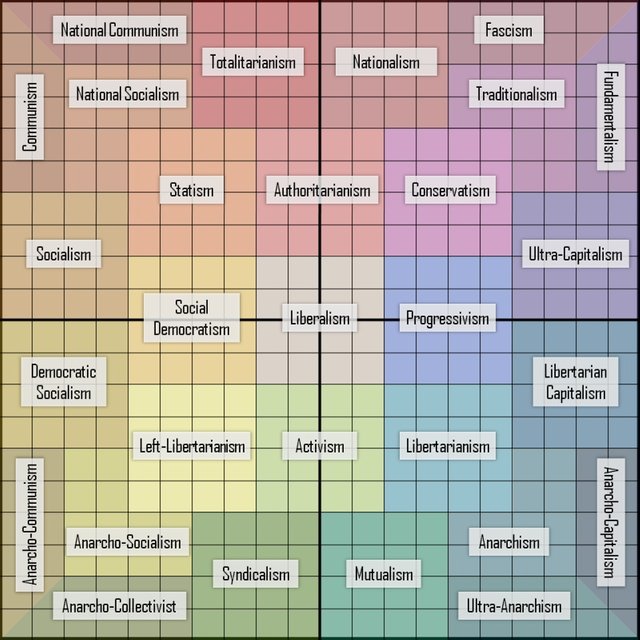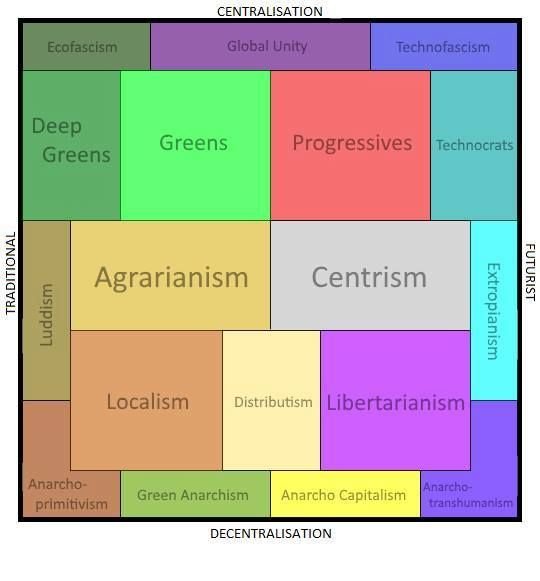A Modern take on the Political Compass
A more future focussed political compass: Traditionalism -> Futurism , Decentralization -> Centralization.

Concise outlines of each ideology:
Fascism: Use the power of a large coercive state to ensure order and allegiance. Physically disrupt any opposition to the power of the state and the established rulers. Use military force to repress dissent and to expand the territory and control of our state to improve our access to resources and our influence at a global level.
Communism: Seize the means of production by force and use them to benefit the collective interest of the working class. Everyone is equal, and everyone is provided the means to survive by the state. All property is collective, and is allocated according to the determinations of the state.
Technocracy: The most qualified experts should lead a powerful state to implement the best policies to advance the technological capabilities of society, regardless of democratic approval or environmental impact. Rule by the most qualified and experienced.
Environmentalism: Protect the environment of Earth at all costs. Use the power of the state to implement policies that disincentive environmental damage, and promote the development of sustainable technologies, regardless of market forces or popular approval. Technologies that pose a threat to biodiversity are actively opposed.
Socialism: The means of production are owned by worker co-operatives. Profits are shared between all workers according to contribution, and high levels of taxation are used to fund welfare programs and extensive social services for all aspects of life. The state has a high level of control over the allocation of resources, but not total control.
Progressivism: Use the state to fund a strong social safety net and public services, particularly education, and healthcare. Progressive taxation combines with market forces to equalise the income and wealth of citizens, while promoting free enterprise.
Agrarianism: Resist the advancement of technology. Opt out of modern civilisation. People should be free to farm and live simply without technological progress corroding traditional values and family structures. Live in harmony with the environment, and resist the power of large corporations by engaging with the local economy and bartering.
Conservatism: Uphold traditional values, and family structures. Protect citizens from our enemies with a strong state operated military, and support police forces to ensure law and order. Limit immigration to protect local jobs from being outsourced and replaced by foreigners. Taxes should be low to promote economic growth.
Centrism: Reserve political judgement and allegiance to ensure social balance. Make decisions on a case by case basis on individual evidence and circumstances, favouring no particular political leaning. Compromise and discourse are essential to a well functioning political framework.
Liberalism: Promote and protect individual freedom. The state should provide a limited social safety net to protect the most vulnerable. Taxes should be moderate to allow for market forces to thrive and for private enterprise to promote economic growth. Promote freedom of speech, and a free market of ideas.
Extropianism: Use technology to improve the human condition. Conduct massive public research and development programs, and develop technological solutions to social problems. Promote the automation of industry and use policies like a universal basic income to allow financial independence after human labour is obsolete.
Localism: Minimise the power of federal governments. Allow small local governments to make more decisions. Smaller government is better, cheaper, and more responsive government. Engage with the local economy and protect local jobs from the exploitation of multinational corporations.
Capitalism: Allow the free market to allocate resources as efficiently as possible. Minimise taxation and regulation to promote economic growth, regardless of environmental impact. Inequality is a fact of life, and serves to motivate success. Free voluntary exchange benefits everyone, and wealth is the best measure of social progress.
Libertarianism: Maximise the individual freedom of citizens. Limit the power of the state, and allow individuals to have full agency over their person and property. Taxation is theft. The force of the state is illegitimate. Free voluntary exchange and interaction benefits everyone, and private alternatives to government services should be favoured.
Primitivism: Technology should be avoided at all costs. The damage done to Earth by Modern human civilization is unsustainable. Find happiness and tranquility in the natural world, not materialistic ideals of wealth. Return to nature and embrace a wholesome and simplistic lifestyle just as our ancestors did. Dismantle modern civilization.
Anarchism: Reject the authority of the state. Live freely and uphold the non-aggression principle. Interact voluntarily with people, and do not initiate force, or obey any claimed authority. Embrace an emergent and chaotic reality, and thrive in radical freedom, while holding a strong individual responsibility.
Transhumanism: Transcend the limitations of the Human mind and body. Embrace advancements in Artificial Intelligence, Biotechnology, and Cybernetics to enhance the human body, and elevate human intelligence. Merge with technology to become a new species unbound by mortality, and evolve beyond what natural selection enables.

The standard political compass uses the axis of Left -> Right and Authoritarianism -> Libertarianism. This conceptualisation of the political compass lacks a dimension of a political focus on technological advancement.

I saw a post from @hilarski yesterday, and it captured my attention. What if we conceptualised a new political compass with different axes? These would be Traditionalism -> Futurism, and Decentralization -> Centralization. I had never seen a compass like it, but found that some of the regions could have been better selected, and arranged. So I made an updated modern political compass, based on the image posted by @hilarski with a few adjustments.
The compass used by @hilarski introduces the Futurist -> Traditional axis into the compass, which I think is a much needed additional dimension to describe ideologies like Transhumanism in relation to other political factions.

[Image Source: Hilarski's Post]
Where I think this graphic could be improved is in the symmetry of the ideological alignments, and substitution of some lesser used and non descriptive ideologies, such as Luddism, Global unity, Green anarchism and Deep greens for more commonly recognised ideologies. I added in Capitalism, Fascism, Liberalism, and Environmentalism to fill some areas more closely and uniquely. I normalized the ideology names to describe the theory, as opposed to its proponents i.e. progressives -> progressivism, greens -> environmentalism. I removed the anarcho prefix from ideologies, and focussed on a general anarchism, which does not have a particular left-right leaning, as it is without state identity and would be based on the individual will of its members interacting voluntarily. With no state, there isn't a left-right paradigm.



Which ideology do you most agree with? Comment below
What changes would you make to the new political compass? Did I do it justice?
Uhm... democratic libertarian satanist? Radical left individualist?
I don't know anymore : D
The fact with this label is that many of them describe a completely different world without caring about how to get there, without considering reality we're living in and history / behaviors of human beings.
I think we should see these label as directions and not end-point.
The more pragmatic anarchist flavor I heard of is crypto-anarchism.